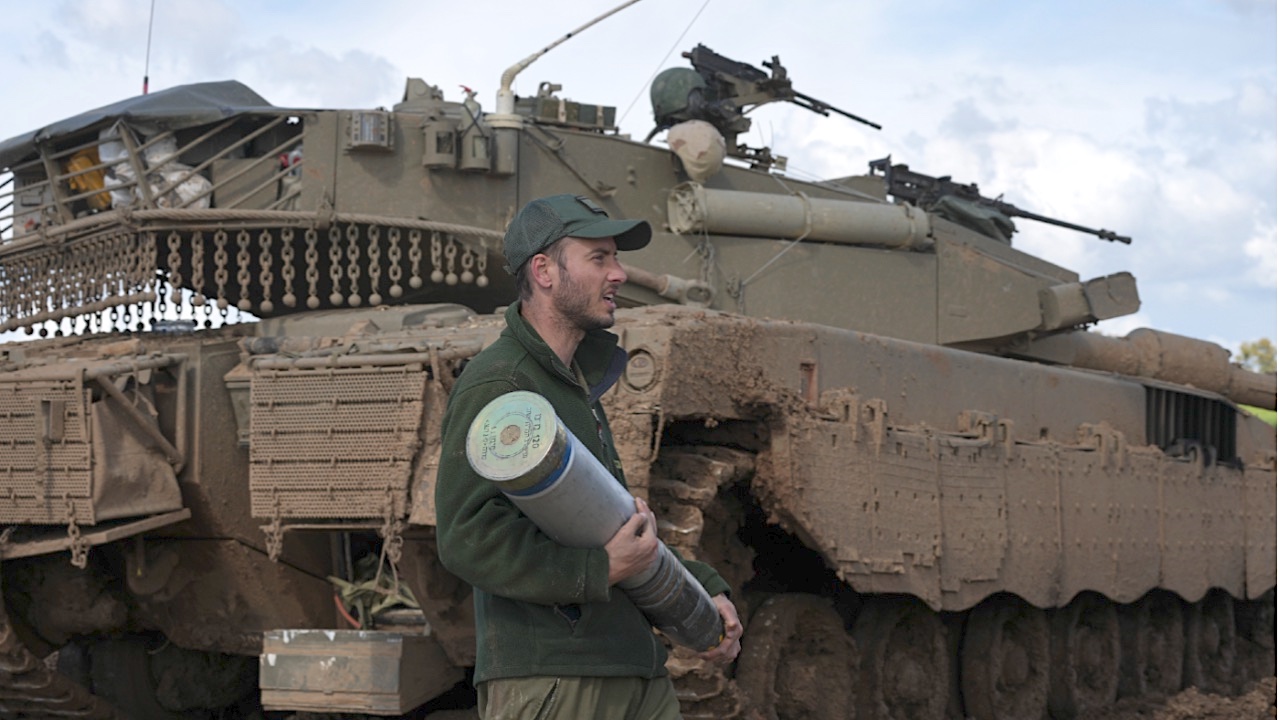An Israeli soldier carries a tank shell at a staging area in southern Israel, near the Gaza border, Thursday, Feb. 1, 2024. (AP Photo/Tsafrir Abayov)
In every war, the decisions of the political leadership place burdens on the military. In the case of Israel on its northern border with Lebanon, the Israel Defense Forces’ mission is to ensure the safety of the civilians of northern Israel, something they failed to do for citizens of the communities around the Gaza Strip.
One of the hoped-for outcomes of Israel’s war in the north is a diplomatic solution. However, it is doubtful that the United Nations Security Council resolution (1701) of 2006, which called for the complete disarmament of the American-designated terrorist organization Hezbollah and its withdrawal north of the Litani River, 20 miles north of the Israeli-Lebanese border, will be agreed to by Iran, the power behind Hezbollah.
What is being discussed is a minimal withdrawal of the terrorist forces from the border that many military strategists might consider too small to be effectively defended.
What does it mean for Israel’s national security and deterrence if the political leadership in Israel, under pressure from the U.S., accepts an inadequate withdrawal of Hezbollah forces from the Israeli-Lebanese border, to nowhere near the secure lines outlined in UNSC 1701?
This is the question that keeps senior IDF officials awake at night — being given a mandate to fully defend the citizens of Israel’s north while they being constrained by an indefensible diplomatic solution.
If Israel accepts the withdrawal of Hezbollah forces to only 10 km north of the Israeli-Lebanese border, will Israeli citizens of the north feel secure enough to return to their homes?
When I spoke to the Mayor of Kiryat Shmona, the largest city in upper Galilee, and his administrative team, as well as the upper Galilee regional council and citizens of western Galilee, all of whom border Lebanon, they seemed insistent that they will need to feel very secure before returning to their homes, especially having seen Hezbollah coming up to the border fence for years without Israeli pushback.
In light of Oct. 7, Israelis’ risk tolerance to put their families in harm’s way has changed. How will the Israeli people feel about the Netanyahu government accepting a Hezbollah withdrawal that falls far short of the one envisioned in resolution 1701, with its 20-mile buffer?
Will the Israeli people consider it a wise, pragmatic move or a capitulation to American politics? If it is the latter, will the people make Bibi pay the price at the ballot box when elections come?
Pragmatism in Jerusalem, the price Israel needs to pay for continued American support with Netanyahu having no choice but to sacrifice complete security in the north for a diplomatic success that satisfies its most crucial ally, will not sit well, not only with Israeli citizens of the north but throughout the country.
The citizens on Israel’s northern border believe that they should be entitled to the maximum security possible as every other Israeli citizen in the country expects and demands. While Netanyahu’s approval rating hovers in the 20s, support for the IDF, despite its operational and intelligence failure on Oct 7, remains around 80 percent.
Could or should northern residents re-envision themselves as a vanguard of pioneers, as in the days of pre-state Israel, when families put themselves in harm’s way to extend the borders of the country, taking turns standing watch at night to make land claims for an eventual state? Today, they seem far less willing to be pawns accepting lesser security, asked to take unreasonable risks living on the northern border.
A nation is only a nation if it can ensure the safety of its citizens right up to its borders. In America, this question arises all the time regarding its southern border, which is porous and has led a growing proportion of Americans to believe that the nation must fulfill its obligation to ensure its primary responsibility, securing its borders.
Israel does not want to go into Lebanon if it doesn’t have to, especially considering that, once they conquer southern Lebanon, they would have no one trustworthy to hand it back to. In other words, for northern Israel, there is no realistic path for a day-after strategy.
After the active fighting in Gaza, one can imagine Israel treating the Gaza Strip as it treats Judea and Samaria, the West Bank, going in and out to extract terrorists and prevent terrorist acts daily. That scenario with an authentic nation-state, Lebanon, even if it is a failed state, is not feasible for the long term.
These choices for the north will be an even more significant security challenge than the threat from Hamas to the South. Israel must first finish its Gaza campaign, conquering Rafah, to dismantle the Hamas terrorist infrastructure entirely.
The perception that Israel is ready to go the distance in the south is what will reverberate in the north. That is the indispensable groundwork needed to get the best diplomatic and military outcome at the northern border.
This article originally appeared in The Hill on March 8, 2024.
Eric Mandel is director of the Middle East Political Information Network and senior security editor for The Jerusalem Report.
